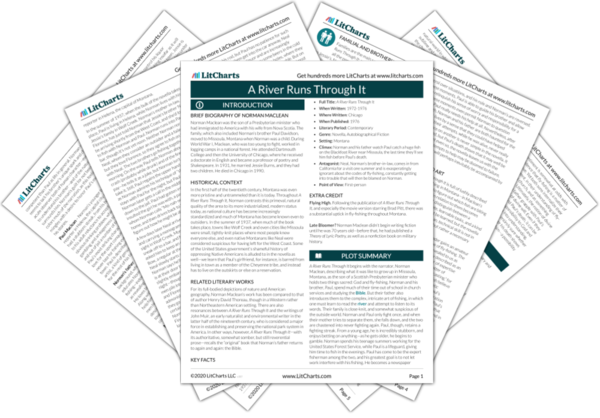While fly-fishing takes place in nature, the novel draws a clear line between the human skill and creativity that makes the craft an art, and the natural world in which people engage in that art. Nature is sublime and awe-inspiring in A River Runs Through It—it makes the characters feel small in comparison, but it is also a source of stability and relief. Influenced by his father’s preaching and the Bible, Norman compares the space of nature to God’s work throughout the book. At many points, the continuity and eternity of the natural world is contrasted to fleeting human affairs—whatever happens to humanity, however we might suffer, the rivers of Montana will continue on. But this point is not an occasion for fear or sadness at human insignificance. Instead, what Maclean emphasizes is the awe that comes from understanding nature’s almighty power. And those who are unable to grasp this power are depicted unsympathetically: when Neal and the prostitute, Old Rawhide, get drunk and fall asleep on the riverbed instead of fly-fishing with Paul and Norman, they are rightfully punished through a painful sunburn. A character like Neal is portrayed as arrogant in his desire to use Montana’s gifts for his own, selfish benefit, rather than acknowledging and admiring nature’s power. This idea of “punishment” also links to an environmental message, which acknowledges that while nature will always continue on, uncaring of human affairs, humans can still corrupt and destroy nature through greed and ignorance.
Even characters who acknowledge nature’s power cannot escape their own human frailty. Paul is more adept than anyone at remaining attuned to nature and respecting Montana’s might. But he is killed unceremoniously, almost trivially, with his body dumped on the ground. His death reminds the other characters that human life can be easily extinguished, in contrast to the mighty rivers that Paul knew and loved, which cannot so quickly be stamped out.
Eternal Nature vs. Human Frailty ThemeTracker

Eternal Nature vs. Human Frailty Quotes in A River Runs Through It
Something within fishermen tries to make fishing into a world perfect and apart—I don’t know what it is or where, because sometimes it is in my arms and sometimes in my throat and sometimes nowhere in particular except somewhere deep. Many of us would probably be better fishermen if we did not spend so much time watching and waiting for the world to become perfect.
The cast is so soft and slow that it can be followed like an ash settling from a fireplace chimney. One of life’s quiet excitements is to stand somewhat apart from yourself and watch yourself softly becoming the author of something beautiful, even if it is only a floating ash.
Poets talk about “spots of time,” but it is really fishermen who experience eternity compressed into a moment. No one can tell what a spot of time is until suddenly the whole world is a fish and the fish is gone.
On the river the heat mirages danced with each other and then they danced through each other and then they joined hands and danced around each other. Eventually the watcher joined the river, and there was only one of us. I believe it was the river.
Even the anatomy of a river was laid bare. Not far downstream was a dry channel where the river had run once, and part of the way to come to know a thing is through its death. But years ago I had known the river when it flowed through this now dry channel, so I could enliven its stony remains with the waters of memory.
It was here, while waiting for my brother, that I started this story, although, of course, at the time I did not know that stories of life are often more like rivers than books. But I knew a story had begun, perhaps long ago near the sound of water. And I sensed that ahead I would meet something that would never erode so there would be a sharp turn, deep circles, a deposit, and quietness.
Then he told me, “In the part I was reading it says the Word was in the beginning, and that’s right. I used to think water was first, but if you listen carefully you will hear that the words are underneath the water.”
“That’s because you are a preacher first and then a fisherman,” I told him. “If you ask Paul, he will tell you that the words are formed out of water.”
“No,” my father said, “you are not listening carefully. The water runs over the words. Paul will tell you the same thing.”
Eventually, all things merge into one, and a river runs through it. The river was cut by the world’s great flood and runs over rocks from the basement of time. On some of the rocks are timeless raindrops. Under the rocks are the words, and some of the words are theirs.
I am haunted by waters.











